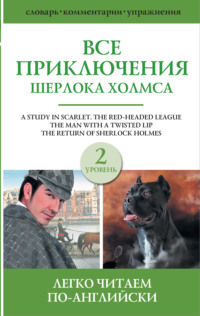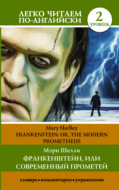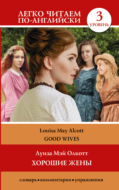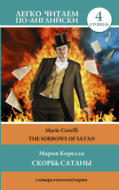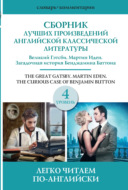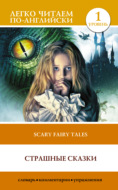Kitabı oku: «Все приключения Шерлока Холмса. Сборник. Уровень 2», sayfa 3
Chapter VII
Light in the Darkness
This news was unexpected. Gregson sprang out of his chair. I stared in silence at Sherlock Holmes, whose lips were compressed.
“Stangerson too!” he muttered.
Lestrade took a chair.
“Are you sure of this?” stammered Gregson.
“I was in his room,” said Lestrade. “I was the first to discover that.”
“Please, Mr. Lestrade, let us know what you saw,” Holmes observed.
“You see,” Lestrade answered, “I thought that Stangerson was concerned in the death of Drebber. I was wrong, it’s true. Anyway, I wanted to find the Secretary. They were together at Euston Station about half-past eight on the evening. At two in the morning Drebber was found in the Brixton Road. The question is: what did Stangerson do between 8.30 and the time of the crime, and what did he do afterwards. I telegraphed to Liverpool. I gave a description of the man, and asked them to watch upon the American boats. I then called upon all the hotels in the vicinity of Euston. You see, if Drebber and his companion become separated, Stangerson stayed somewhere in the vicinity for the night, and then went to the station again next morning.”
“They agreed on some meeting-place beforehand,” remarked Holmes.
“Yes, they did. I spent the whole of yesterday, I was looking for Stangerson. No luck. This morning I began very early, and at eight o’clock I reached Halliday’s Private Hotel, in Little George Street. I asked if Mr. Stangerson was living there, and they answered me ‘yes’.
‘No doubt you are the gentleman whom he was expecting,’ they said.
‘Where is he now?’ I asked.
‘He is upstairs in bed.’
‘I will go up and see him at once,’ I said.
His room was on the second floor. From under the door there curled a little red ribbon of blood, which formed a little pool. The door was locked on the inside45, but we put our shoulders to it, and entered. The window of the room was open, and beside the window lay the body of a man in his nightdress. He was dead, his limbs were rigid and cold. When we turned him over, the men from the hotel recognized him at once. It was the gentleman who engaged the room under the name of Joseph Stangerson. The cause of death was a deep stab in the left side. And now comes the strangest part of the affair. What was above the murdered man?”
“The word RACHE, written in letters of blood,” said Holmes.
“That was it!” said Lestrade.
“A milk boy saw the murder,” continued Lestrade. “He was going to the dairy. He walked down the lane which leads from the mews at the back of the hotel. He noticed that a ladder was raised against one of the windows of the second floor, which was wide open. And he saw a man who was descending the ladder. The boy thought it was a carpenter. The man was tall, had a reddish face, and was dressed in a long, brownish coat. He stayed in the room some little time after the murder, for we found blood-stained water in the basin. We also found marks on the sheets where he wiped his knife.”
I glanced at Holmes.
“Did you find anything in the room which gave a clue to the murderer?” he asked.
“Nothing. Stangerson had Drebber’s purse in his pocket, but it was usual, as he paid. There was eighty pounds in it. So robbery is not the motives of these extraordinary crimes. There were no papers in the murdered man’s pocket, except a single telegram, dated from Cleveland about a month ago: ‘J. H. is in Europe’.”
“And there was nothing else?” Holmes asked.
“Nothing of any importance. The novel, which the man read, was lying upon the bed, and his pipe was on a chair beside him. There was a glass of water on the table, and on the window-sill a small chip ointment box containing a couple of pills.”
Sherlock Holmes sprang from his chair with an exclamation of delight.
“The last link!” he cried, exultantly.
The two detectives stared at him in amazement.
“Now I know everything,” my companion said, confidently, “What about those pills?”
“I have them,” said Lestrade. He showed us a small white box; “I took them and the purse and the telegram.”
“Give them here,” said Holmes. “Now, Doctor,” he turned to me, “are those ordinary pills?”
They certainly were not. They were of a pearly grey colour, small, round, and almost transparent.
“I think that they are soluble in water,” I remarked.
“Precisely so,” answered Holmes. “Now please go down and fetch that poor little terrier which the landlady wanted you to put out of its pain46yesterday.”
I went downstairs and carried the dog upstairs in my arms. It was not far from its end. I placed the terrier upon a cushion on the rug.
“I will now cut one of these pills in two,” said Holmes. “One half we return into the box. The other half I will place in this glass, in which is a teaspoonful of water. You perceive that our friend, the Doctor, is right, and that it readily dissolves.”
“This may be very interesting,” said Lestrade, “I cannot see, however, how it is connected with the death of Mr. Joseph Stangerson.”
“Patience, my friend, patience! I shall now add a little milk and give this mixture to the dog.”
As he spoke he turned the contents of the glass into a saucer and placed it in front of the terrier, who speedily drank it. Nothing happened, however. The dog continued to lie and breathe.
An expression of the utmost chagrin and disappointment appeared upon Holmes’ face. He gnawed his lip, and showed symptoms of acute impatience. Two detectives smiled derisively.
“It can’t be a coincidence,” Holmes cried; “it is impossible. These pills which I suspected in the case of Drebber! They are here. And yet they are inert. What can it mean? It is impossible! Ah, I have it! I have it!”
With a perfect shriek of delight he rushed to the box, cut the other pill in two, dissolved it, added milk, and gave it to the terrier. The unfortunate dog drank the mixture again, gave a convulsive shiver, and lay lifeless.
Sherlock Holmes wiped the perspiration from his forehead.
“Of the two pills in that box one was of the most deadly poison,” he said; “and the other was entirely harmless.”
“Look here, Mr. Sherlock Holmes,” said Mr. Gregson, “we are all ready to acknowledge that you are a smart man, and that you have your own methods of working. It seems I was wrong. It appears that Lestrade was wrong too. But we have a right to ask you straight how much you do know of the business. Can you name the man who did it?”
“Yes, sir,” remarked Lestrade. “We both tried, and we both failed. But what is your opinion?”
“If you know the assassin, let’s arrest him,” I observed. “He may kill again.”
Holmes showed signs of irresolution.
“There will be no more murders,” he said at last. “You ask me if I know the name of the assassin. I do. But the question is to catch him. We deal with a shrewd and desperate man. And he has another one who is as clever as himself. If he has the slightest suspicion, he will change his name and vanish in an instant among the four million inhabitants of this great city. Gentlemen, I promise that I will communicate with you when I’m ready to catch him.”
Gregson and Lestrade were not satisfied. There was a tap at the door, and young Wiggins came in.
“Please, sir,” he said, “I have the cab downstairs.”
“Good boy,” said Holmes, blandly. He took a pair of steel handcuffs from a drawer. “See how they fasten in an instant.”
“The old handcuffs are good enough,” remarked Lestrade.
“Very good, very good,” said Holmes. “The cabman will help me with my boxes. Ask him to come, Wiggins.”
I was surprised. Holmes was going to travel somewhere, and he did not say anything to me about it. There was a small portmanteau in the room. The cabman entered the room.
“Please help me with this buckle, cabman,” Holmes said.
The fellow came forward and put down his hands to assist. At that instant there was a sharp click, the jangling of metal, and Sherlock Holmes sprang to his feet again.
“Gentlemen,” he cried, “let me introduce you to Mr. Jefferson Hope, the murderer of Enoch Drebber and of Joseph Stangerson.”
For a second or two we were a group of statues. Then, with a roar of fury, the cabman hurled himself through the window. Gregson, Lestrade, and Holmes sprang upon him like staghounds. They dragged him back into the room. The man was very powerful and fierce. Finally Lestrade got his hand inside his neckcloth and half-strangled him. We pinioned his feet as well as his hands.
“We have his cab,” said Sherlock Holmes. “It will take him to Scotland Yard. And now, gentlemen,” he continued, with a pleasant smile, “we see the end of our little mystery. Welcome to put any questions, and I will answer them.”
Part II
Chapter I
On the Great Alkali Plain
In the central portion of the great North American Continent there lies an arid and repulsive desert. There are no inhabitants of this land of despair. Coyotes and grizzly bears are the sole dwellers in the wilderness.
One can see a pathway across the desert, which winds away and is lost in the extreme distance. There stood upon the fourth of May, eighteen hundred and forty-seven, a solitary traveller. It was difficult to say whether he was nearer to forty or to sixty. His face was lean and haggard; his long, brown hair and beard were white. His hand grasped his rifle. The man was dying-dying from hunger and from thirst.
He deposited upon the ground a large bundle, which he was carrying over his right shoulder. It was too heavy for his strength. Instantly a moaning cry broke from the grey parcel, and from it there protruded a small, scared face, with bright brown eyes.
“You hurt me!” said a childish voice reproachfully.
“I’m sorry,” the man answered penitently.
As he spoke he unwrapped the grey shawl and extricated a pretty little girl of about five years of age.
“How is it now?” he answered anxiously.
“Kiss it,” she said. “My mother did so. Where’s mother?”
“She went away. I think you’ll see her soon.”
“She didn’t say good-bye,” said the little girl. “I’m thirsty and hungry. Is there any water, or anything to eat?”
“No, nothing, dear. Be patient, and then you’ll be all right. What’s that?”
“Pretty things! Fine things!” cried the little girl enthusiastically. She held up two glittering fragments of mica. “When we come back home I’ll give them to brother Bob.”
“You’ll see prettier things soon,” said the man confidently. “Just wait a bit. Do you remember when we left the river?”
“Oh, yes.”
“Well, there was something wrong; compasses, or map, or something, you see. And we have no water.”
“And you can’t wash yourself,” interrupted his companion gravely.
“No, nor drink. And Mr. Bender was the first who dies, and then Indian Pete, and then Mrs. McGregor, and then Johnny Hones, and then, my dear, your mother.”
“Oh, mother is dead too!” cried the little girl.
“Yes, they all went except you and me. And there’s a small chance for us now!”
“Do you mean that we are going to die too?” asked the child.
“I think so.”
“Why didn’t you say so before?” she said. “So we’ll be with mother again.”
“Yes, you will, dear.”
“And you too. She will meet us at the door of Heaven with a big pitcher of water, and a lot
of buckwheat cakes. How long will we wait?”
“I don’t know-not very long.”
The man saw three large brown birds. They were buzzards, the vultures of the west, the forerunners of death.
“Cocks and hens,” cried the little girl gleefully. “Say, did God make this country?”
“In course He did,” said her companion.
“He made Illinois, and He made Missouri,” the little girl continued. “I guess somebody else made the country here. They forgot the water and the trees.”
“We can pray, can’t we?” the man said.
“Then kneel down,” the little girl said.
It was a strange sight. Side by side on the narrow shawl knelt the two wanderers, the little child and the reckless adventurer.
The prayer finished. They went to sleep.
Far away the tilts of waggons and the figures of armed horsemen began to show up. It was a great caravan upon its journey for the West.
At the head of the column there rode grave men. They held a short council among themselves.
“The wells are to the right, my brothers,” said a man with grizzly hair.
“To the right of the Sierra Blanco-so we shall reach the Rio Grande,” said another.
Suddenly they saw pink clothes.
“I shall go forward and see, Brother Stangerson,” said a horseman.
“And I,” “and I,” cried a dozen voices.
“Leave your horses below and we will await you here,” the Elder answered.
In a moment the horsemen dismounted, fastened their horses, and were ascending the slope. They advanced rapidly and noiselessly.
On the little plateau there stood a single giant boulder, and against this boulder there lay a tall man, he was asleep. Beside him lay a little child. On the ledge of rock above this strange couple there stood three buzzards, who, at the sight of the new comers flew sullenly away.
The cries of the birds awoke the two sleepers. The man staggered to his feet and looked around. “This is what they call delirium, I guess,” he muttered. The child stood beside him.
The newcomers convinced them that their appearance was no delusion. One of them seized the little girl, and hoisted her upon his shoulder, while two others assisted her gaunt companion towards the waggons.
“My name is John Ferrier,” the wanderer explained; “we were twenty-one people. The rest are all dead in the south.”
“Is she your child?” asked someone.
“Yes, she is,” the man answered, defiantly; “she’s mine because I saved her. No man will take her from me. She’s Lucy Ferrier. Who are you? I see many people here.”
“About ten thousand,” said one of the young men; “we are the children of God.”
“Oh, He has many children,” said the wanderer, “a crowd.”
“Do not jest at that which is sacred,” said the other sternly. “We believe in those sacred writings, drawn in Egyptian letters on plates of beaten gold, which were handed unto the holy Joseph Smith at Palmyra. We come from Nauvoo, in the State of Illinois, where we founded our temple. We seek a refuge from the violent man and from the godless people.”
“I see,” the man said, “you are the Mormons.”
“We are the Mormons,” answered his companions.
“And where are you going?”
“We do not know. The hand of God is leading us. You must come before our Prophet. He will say what to do with you.”
They reached a great beautiful waggon. Six horses were yoked to it. Beside the driver there sat a man, thirty years of age. His massive head and resolute expression marked him as a leader. He was reading a volume, but as the crowd approached he laid it aside, and listened attentively to the story of the castaways. Then he turned to them.
“If we take you with us,” he said, “you must become believers in our creed. We shall have no wolves in our fold. Will you come with us on these terms47?”
“I’ll come with you on any terms,” said Ferrier.
“Take him, Brother Stangerson,” he said, “give him food and drink, and the child likewise. Teach him our holy creed. Forward! On, on to Zion!”
“On, on to Zion!” cried the crowd of Mormons.
The Elder led the two waifs to his waggon, where a meal was already awaiting them.
“You will remain here,” he said. “Remember that now and for ever you are of our religion. Brigham Young said it, and he spoke with the voice of Joseph Smith, which is the voice of God.”
Chapter II
The Flower of Utah
The Mormons were going forward before they came to their final haven. The savage men, and the savage beast, hunger, thirst, fatigue, and disease-they overcame all this with Anglo-Saxon tenacity. When they saw the broad valley of Utah beneath them, they learned from the lips of their leader that this was the promised land48.
Young was a skilful administrator as well as a resolute chief. He planned the future city, Salt Lake City, and they began to build it. Stangerson, Kemball, Johnston, and Drebber were the four principal Elders. Everything prospered in the settlement. Above all, the great temple in the centre of the city grew ever taller and larger.
The two castaways, John Ferrier and the little girl accompanied the Mormons to the end of their great pilgrimage. Little Lucy Ferrier lived in Elder Stangerson’s waggon, with the Mormon’s three wives and with his son, a boy of twelve. In the meantime Ferrier became a useful guide and an indefatigable hunter.
On the farm John Ferrier built himself a substantial house. He was a practical man, keen and skilful. He was working all day long. In three years he became richer than his neighbours, in six years he became really rich, and in twelve years a few men in the whole of Salt Lake City could compare with him.
There was only one thing in which he offended his co-religionists. He did not want to marry. Ferrier remained strictly celibate.
Lucy Ferrier grew up and assisted her adopted father in all his undertakings. She grew taller and stronger. So her father became the richest of the farmers, and she became the most beautiful girl. It was a warm June morning, and the Mormons were as busy as the bees. Lucy Ferrier galloped with a commission from her father. She reached the outskirts of the city, but the road was blocked by cattle. Soon she found herself49 completely imbedded in the stream of bullocks. Unfortunately the horns of one of the creatures pierced the flank of her mustang, and excited it to madness. The situation was full of peril. The girl did not know what to do. Suddenly she heard a kindly voice at her elbow. At the same moment a sinewy brown hand caught the frightened horse by the curb, and soon brought her to the outskirts.
“You’re not hurt, I hope, miss,” said her preserver, respectfully.
She looked up at his dark, fierce face, and laughed saucily.
“I’m awful frightened,” she said, naively.
“I guess you are the daughter of John Ferrier,” the man remarked. “When you see him, ask him if he remembers the Jefferson Hopes of St. Louis. If he’s the same Ferrier, my father and he were friends.”
“Why don’t you come and ask yourself?” she asked, demurely. “Of course, you are a friend now. You saved me. You must come and see us. Good-bye!”
“Good-bye,” he answered.
When she vanished from his sight, Young Jefferson Hope realized that love came in his life. He came to John Ferrier that night, and many times again. He told John and his daughter the news of the outside world. He was a pioneer in California, and narrated many interesting tales. Jefferson Hope soon became a favourite with the old farmer, who spoke eloquently of his virtues. Lucy was silent, but her blushing cheek and her bright, happy eyes, showed that her young heart was no longer her own. This man won her affections.
It was a summer evening when he came. She was at the doorway, and came down to meet him. “I am off50, Lucy,” he said. He took her two hands in his, and gazed tenderly down into her face; “I won’t ask you to come with me now, but will you be ready to come when I am here again?”
“And when will that be?” she asked.
“A couple of months. I will come back, my darling.”
“And how about father?” she asked.
“He will give his consent, if the mines work all right. And they will, for sure.”
“Oh, well; of course,” she whispered.
“Thank God!” he said hoarsely and kissed her. “So good-bye, my darling-good-bye. In two months you will see me.”
Lucy stood at the gate. She was gazing after him until he vanished from her sight. Then she walked back into the house, the happiest girl in all Utah.
Chapter III
John Ferrier Talks with the Prophet
Three weeks passed. John Ferrier was sad when he thought of the young man’s return, and of the loss of his child. He did not want to allow his daughter to wed a Mormon. Such a marriage he regarded as no marriage at all, but as a shame and a disgrace. But he was silent: to express an unorthodox opinion was dangerous in those days in the Land of the Saints.
Its invisibility, and the mystery made this religious organization terrible. It was omniscient and omnipotent. The man who said something against the Church vanished away. A rash word or a hasty act led to annihilation.
The Mormons needed women. Polygamy without a female population was a barren doctrine. Strange rumours came-rumours of murdered immigrants. Fresh women appeared in the harems of the Elders-women with the traces of an unextinguishable horror upon their faces. None knew who belonged to this ruthless society. The names of the participators in the deeds of blood and
violence were secret. Hence every man feared his neighbour.
One fine morning, John Ferrier heard the click of the latch. He looked through the window and saw a stout, sandy-haired, middle-aged man. It was Brigham Young himself.
Ferrier ran to the door to greet the Mormon chief. Young, however, received his salutations coldly, and followed him with a stern face into the sitting-room.
“Brother Ferrier,” he said, “the true believers are good friends to you. We picked you up when you were starving in the desert, we shared our food with you, led you to the Chosen Valley, gave you a goodly share of land, and allowed you to become rich under our protection. Is not this so?”
“It is so,” answered John Ferrier.
“In return for this, you promised to embrace the true faith. This you promised to do, and this you neglected.”
“And how did I neglect it?” asked Ferrier. “I give to the common fund, I visit the Temple. I…”
“Where are your wives?” asked Young.
“It is true that I am not married,” Ferrier answered. “But women are few, and there are many men who are better husbands than myself. I am not a lonely man: I have my daughter.”
“Yes, I want to talk to you about your daughter,” said the leader of the Mormons. “She is the flower of Utah.”
John Ferrier groaned internally.
“They say that she is engaged to some Gentile. This must be the gossip of idle tongues. What is the thirteenth rule in the code of the sainted Joseph Smith? ‘Let every maiden of the true faith marry one of the elect; for if she weds a Gentile, she commits a grievous sin’.”
John Ferrier did not answer, but he played nervously with his riding-whip.
“The girl is young, and we don’t want to deprive her of all choice. We Elders have many heifers, but our children must also have decent wives. Stangerson has a son, and Drebber has a son, and they will gladly welcome your daughter to their house. Let her choose between them. They are young and rich, and of the true faith. What will say you to that?”
Ferrier remained silent for some time.
“Give us time,” he said at last. “My daughter is very young-she is too young to marry.”
“She will have a month to choose,” said Young. “At the end of that time she will give her answer.”
He was passing through the door, when he turned, with flushed face and flashing eyes.
“John Ferrier,” he thundered, “do not put your weak wills51 against the orders of the Holy Four!”
And he went away. Ferrier heard his heavy step along the path.
Ferrier was still sitting with his elbows upon his knees, when he saw his daughter. She was standing beside him. She heard everything.
“Oh, father, father, what shall we do?” she said.
“Don’t be afraid,” he answered. “We’ll fix it up somehow or another52. You still like that chap, do you?”
A sob and a squeeze of his hand was her only answer.
“He’s a good lad, and he’s a Christian. Some people will go to Nevada tomorrow, and I’ll send him a message. If I know anything of that young man, he’ll be back here soon.”
Lucy laughed through her tears.
“When he comes, he will give us some advise. But it is for you that I am frightened, dear. One hears such dreadful stories about those who oppose the Prophet: something terrible always happens to them.”
“But we don’t oppose him,” her father answered. “We have time. We have a clear month before us; at the end of that, I guess we will leave Utah.”
“Leave Utah!”
“Yes.”
“But the farm?”
“We will sell as much as we can. I don’t want to knuckle under to any man, under to this darned prophet. I’m a free-born American.”
“But they won’t let us leave,” his daughter objected.
“Wait till Jefferson comes, and we’ll soon manage that. There’s no danger at all.”
John Ferrier uttered these consoling remarks in a very confident tone, but she observed that he fastened the doors that night, and carefully cleaned and loaded the old shotgun.
Ücretsiz ön izlemeyi tamamladınız.
